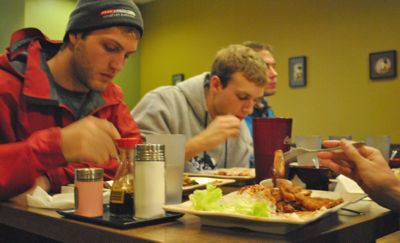Page 74 • (1,574 results in 0.026 seconds)
-
courses developed by faculty during previous semesters. Example sites include Introduction to Sociology, General Chemistry, How Writing Works, Introduction to Psychology, the Profession of Theatre, and an online Introduction to Music course. Check out a few of these courses for Sakai inspiration and ideas that might be useful in your own teaching. Resources to Experiment with Sakai If you are interested in improving your skills with Sakai, consider requesting a Sakai Sandbox site where you can
-
following definition is provided: “We define general education as the cultivation of the knowledge, skills, and attitude that all of us use and live by during most of our lives — whether as parents, citizens, lovers, travelers, participants in the arts, leaders, volunteers, or good Samaritans.”
-
, and the use of information in creating new knowledge and participating ethically in communities of practice.” What results, then, is a view of information literacy that moves away from skills and into habits of mind that are reinforced throughout the students’ educational experiences. The outcomes as stated above stem from work done at the University of Arizona Libraries, where the librarians worked with faculty to develop a full set of information literacy outcomes. In addition to this
-
leadership and management skills through the pursuit of the MSN-COM degree. Award Amount: varies Eligibility: All applicants apply to the ELMSN or MSN program are eligible for these scholarships. Terms of the Award: These scholarships are awarded for one year and a portion of it can be renewed for a second year by maintaining full-time student status, good standing in the program including a 3.0 or better in all courses, and a cumulative GPA of 3.0 or better. Application Procedure: Scholarship will only
-
Student teacher, Erin Kealy, working with students during Spring 2021. Student teacher Maya Adams conducting at the Silas High School fall concert. Student teacher Teresa Keck took 4th and 5th grade students to sing the national anthem at a Rainiers game. Music Education at PLUMusic Education at PLU is a rigorous program with opportunities for specialization in an area of interest. It is characterized by a strong performance component, relevant coursework, and time practicing teaching skills in
-
specific deadlines for application or declaration – contact the department or program chair for information.Career ConnectionsCareer Connections embodies PLU’s commitment to helping students discover their career aspirations. However, the PLU approach to career readiness is distinct. A PLU education not only prepares students to excel by building excellent intellectual skills, but also by connecting them with opportunities to realize their potential and find meaning and purpose in their work. Career
-
between PLU and outside agencies when traditional means of communication are interrupted. PLU employees bring a rich array of skills and experiences that may or may not be recognized or utilized in their current positions. This may be just the opportunity to extend your experience into a new arena. Please contact Jennifer Wamboldt at 6042 or wamboljm@plu.edu if interested. Read Previous Drawn to serve Read Next Wang Symposium 2012: Maude Barlow talks on the importance of conserving our most precious
-

December 1, 2012 Tim Hurd ’13: ‘A man, a can, a plan.’ Hurd and other members of the men’s Ultimate Frisbee team grab dinner after practice at Uni Teriyaki. “Nothing is very consistent with my meal patterns,” Hurd said. He’ll eat whatever he has around the house if he needs a snack, but he eats out most of the time because he doesn’t have the time or skills to cook for himself. On the rare occasion he does cook for himself, he relies on a cookbook his mom and grandma bought him called “A Man, a
-
All students are expected to render safe, quality nursing care to all clients. Students are expected to know policies and procedures that reduce the risk of spread of infection to self and others. Students must demonstrate an understanding of infection control principles, including the transmission of HIV/AIDS, through tests or certification. Other skills which incorporate measures to decrease the transmission of infection will be validated in the practice laboratory prior to the clinical
-
So You Want to be an Occupational Therapist?Occupational therapists (OTs) are health care professionals who treat injured, ill, or disabled patients through the therapeutic use of everyday activities. They help these patients develop, recover, and improve the skills needed for daily living and working. Occupational therapists: Help children thrive in the “occupations” of childhood, which include learning, playing, and growing. Therapists work in schools with students who have learning
Do you have any feedback for us? If so, feel free to use our Feedback Form.


